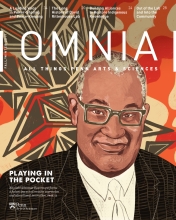An Arts & Sciences Welcome
The fall semester brings new faces to campus—faculty, grad students, visiting researchers, and, of course, undergraduate students. As the largest undergraduate school at Penn, so many of these new faces call the College their home. For first-year students experiencing college life for the first time, fall is especially exciting. And there is a “first” that is increasingly common on campus: students who are the first members of their families to attend college.
Opening our doors to first-generation students is an integral piece of Penn’s unflagging commitment to access. And we are making good on this commitment: 14 percent of the Class of 2023 identify as first-generation. This is possible thanks to need-blind admissions and our grant-based financial aid program—the largest in the country. But our commitment doesn’t end with meeting financial need. We know that scholarships are important, but truly supporting the success of these students involves much more.
To ensure a welcoming and supportive environment, Penn has launched Penn First Plus, a multifaceted initiative in support of first-generation students. In many ways, these initiatives are formalizing what has always been part of our institutional DNA at Penn Arts & Sciences. Our dedicated faculty have long made a priority out of connecting with their students and helping them succeed in a challenging academic environment.
It is fitting that Paul Sniegowksi, Stephen A. Levin Family Dean of the College, has long been committed to building relationships with undergraduates and guiding University policies to ensure that their classroom and campus experiences are meaningful.
Then there’s Philip Gressman of the Department of Mathematics, who asks students in his entry-level calculus class to write reflections on their experiences for next year’s class. This experiment has confirmed that validating students’ challenges and empowering them to act as resources has a powerful effect on feelings of belonging and capability. In Biology, undergraduate chair Mecky Pohlschröder oversees initiatives to reach all students, including informal get-togethers that introduce students to faculty from similar backgrounds or with related interests, and mentoring activities that pair students from underrepresented groups with their peers pursuing advanced degrees.
In this issue, you’ll read about Herman Beavers of English and Africana Studies, who reflects on his commitment to classroom and community, as well as the lives of the students he’s mentored. And Simon Richter of German was motivated to plan the fall event series, the 1.5 Minute Climate Lectures, after listening to student concerns about our environment.
These examples illustrate the norm for our faculty, who are committed to inclusive teaching and engagement with students. It’s no accident that the pillars of the Power of Penn Arts & Sciences Campaign are our extraordinary faculty and curious, driven students. They’re at work together as members of a community committed to discovery and learning. It is a commitment that never stops, yet each fall is invigorated by new people and new ideas.




